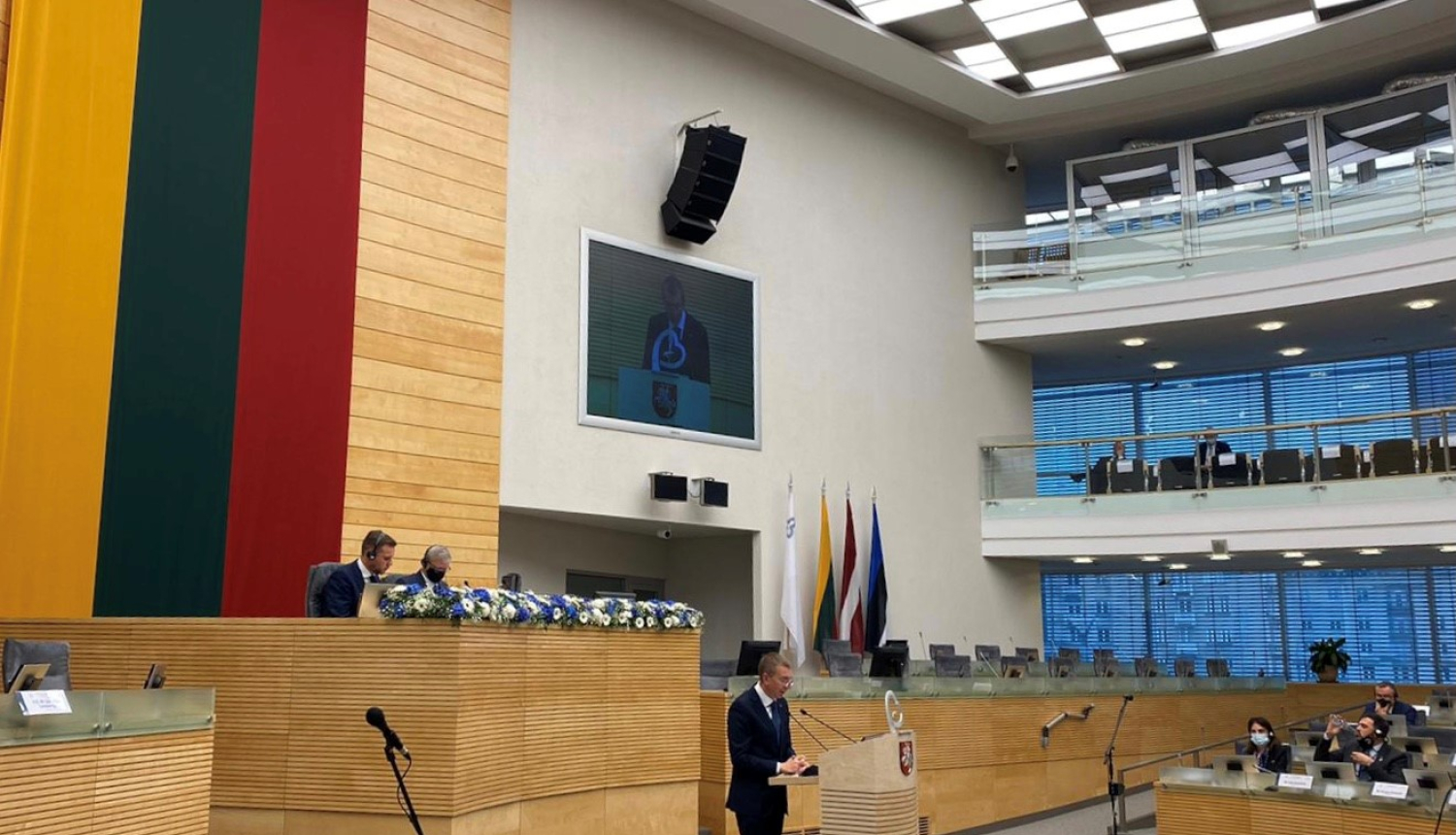On 5 November 2021, the Minister of Foreign Affairs of Latvia Edgars Rinkēvičs participated in the 40th session of the Baltic Assembly and the 27th meeting of the Baltic Council, which took place in Vilnius, the capital of Lithuania. In his address, E. Rinkēvičs congratulated the parliamentarians of the Baltic States on the 30th anniversary of the restoration of independence of Latvia, Lithuania and Estonia.
The Minister praised the work of the Lithuanian Presidency in working with the Baltic States on traditionally important issues of cooperation. At the same time, the Minister expressed his conviction that close cooperation should be maintained to curb the Covid-19 pandemic.
E. Rinkēvičs pointed out that joint security and defense planning, effective border management and information security of the Baltic States are especially important. The Baltic region must be prepared to respond to the changing security environment, regularly threatened by harmful hybrid activities, primarily from Russia and more recently also from Belarus. “Both the transatlantic relationship and the unity of the European Union are important to us. Security solutions are becoming increasingly global and are interlinked with other international policies, such as the rule of law or trade. That is why coordinated cooperation between the transatlantic partners is important to us. It is important for the Baltic region to modernize the force structure and increase the readiness of NATO forces, to make NATO's collective defense and deterrence measures more effective. The development of NATO’s Strategic Concept is one of the key challenges and the meeting of NATO Foreign Ministers in Riga will be the first discussion of the Foreign Ministers on the concept,” said E. Rinkēvičs.
Speaking about the forthcoming Eastern Partnership Summit in Brussels, the Latvian Foreign Minister expressed confidence that the Eastern Partnership Summit must show that the European Union (EU) and partner countries are willing and able to move closer and ensure the sustainability and development of the Eastern Partnership policy. It is therefore necessary to strengthen existing cooperation with Ukraine, Georgia and Moldova, while maintaining the Eastern Partnership as a single platform. These countries must be given the opportunity to gradually integrate into the EU internal market, as well as promoting in-depth sectoral cooperation, including in the field of security and defence. Equally, Ukraine should be supported in its reform process. It is important for Ukraine to continue the ongoing reforms, especially in the judiciary and in reducing corruption. Kiev must be aware of the importance of reforms not only in pursuing its course of Euro-Atlantic integration, but also in strengthening the country's resilience.
“With regard to the situation in Belarus, I believe that a strong fifth round of sanctions would signal the unity of the European Union. We need to support changes in European Union legislation that will allow Member States to better protect their borders. At the same time, we must provide direct and strong support to Belarusian civil society, NGOs and the independent media. The assessment of Russia's internal political processes and foreign policy activities shows few positive trends. Relations with Russia require a principled position, in the provision of which a unified response to violations of international law by Russia in matters of foreign relations and violations of human rights and democratic freedoms in Russia is crucial,” said the Minister.
E. Rinkēvičs expressed satisfaction that the Rail Baltica project has entered the practical implementation phase with the aim to complete the project as soon as possible. At the same time, sufficient funding is needed, as well as the efficient use of the funding allocated. It is also important to develop a single digital 5G corridor in both Via Baltica and Rail Baltica infrastructure. It is important to continue to move forward in the energy sector, as the timely synchronization of the Baltic electrical grids with the European grids by 2025 must be a priority. The regional gas market established by Latvia, Estonia and Finland is working well and could be a good example for other EU regions.
“Existing increases in energy prices have been driven mainly by global factors, and the new situation can be addressed through support and solutions at European Union level. In the short term, however, Member States should focus on measures that could mitigate price increases for households and businesses as soon as possible,” – said E. Rinkēvičs.
In 2022, Latvia will take over the presidency of the Baltic Assembly and the Baltic Council of Ministers, therefore, E. Rinkēvičs introduced the participants to the priority issues of the Latvian Presidency: strengthening security and defense in the region, combating hybrid threats and disinformation, economic modernization, promoting the green and digital transition, connectivity and the development of regional infrastructure projects, as well as strengthening the strategic and ambitious Eastern Partnership and supporting civil society in Belarus.
“Next summer, Latvia will host the seventh Three Seas Initiative Summit and Business Forum. We want the Three Seas Initiative Summit in Riga to promote transatlantic cooperation, as well as cooperation between the countries of the region, stimulating the attraction of investments to the growth of the region as a whole,” concluded E. Rinkēvičs.




